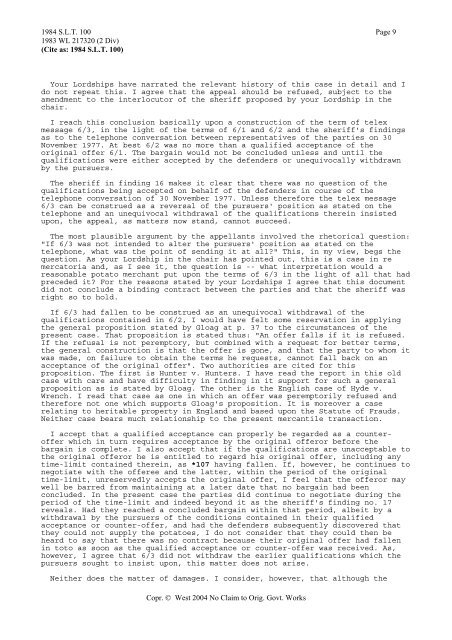Tesco v Constain - Thomson Reuters
Tesco v Constain - Thomson Reuters
Tesco v Constain - Thomson Reuters
Create successful ePaper yourself
Turn your PDF publications into a flip-book with our unique Google optimized e-Paper software.
1984 S.L.T. 100 Page 91983 WL 217320 (2 Div)(Cite as: 1984 S.L.T. 100)Your Lordships have narrated the relevant history of this case in detail and Ido not repeat this. I agree that the appeal should be refused, subject to theamendment to the interlocutor of the sheriff proposed by your Lordship in thechair.I reach this conclusion basically upon a construction of the term of telexmessage 6/3, in the light of the terms of 6/1 and 6/2 and the sheriff's findingsas to the telephone conversation between representatives of the parties on 30November 1977. At best 6/2 was no more than a qualified acceptance of theoriginal offer 6/1. The bargain would not be concluded unless and until thequalifications were either accepted by the defenders or unequivocally withdrawnby the pursuers.The sheriff in finding 16 makes it clear that there was no question of thequalifications being accepted on behalf of the defenders in course of thetelephone conversation of 30 November 1977. Unless therefore the telex message6/3 can be construed as a reversal of the pursuers' position as stated on thetelephone and an unequivocal withdrawal of the qualifications therein insistedupon, the appeal, as matters now stand, cannot succeed.The most plausible argument by the appellants involved the rhetorical question:"If 6/3 was not intended to alter the pursuers' position as stated on thetelephone, what was the point of sending it at all?" This, in my view, begs thequestion. As your Lordship in the chair has pointed out, this is a case in remercatoria and, as I see it, the question is -- what interpretation would areasonable potato merchant put upon the terms of 6/3 in the light of all that hadpreceded it? For the reasons stated by your Lordships I agree that this documentdid not conclude a binding contract between the parties and that the sheriff wasright so to hold.If 6/3 had fallen to be construed as an unequivocal withdrawal of thequalifications contained in 6/2, I would have felt some reservation in applyingthe general proposition stated by Gloag at p. 37 to the circumstances of thepresent case. That proposition is stated thus: "An offer falls if it is refused.If the refusal is not peremptory, but combined with a request for better terms,the general construction is that the offer is gone, and that the party to whom itwas made, on failure to obtain the terms he requests, cannot fall back on anacceptance of the original offer". Two authorities are cited for thisproposition. The first is Hunter v. Hunters. I have read the report in this oldcase with care and have difficulty in finding in it support for such a generalproposition as is stated by Gloag. The other is the English case of Hyde v.Wrench. I read that case as one in which an offer was peremptorily refused andtherefore not one which supports Gloag's proposition. It is moreover a caserelating to heritable property in England and based upon the Statute of Frauds.Neither case bears much relationship to the present mercantile transaction.I accept that a qualified acceptance can properly be regarded as a counterofferwhich in turn requires acceptance by the original offeror before thebargain is complete. I also accept that if the qualifications are unacceptable tothe original offeror he is entitled to regard his original offer, including anytime-limit contained therein, as *107 having fallen. If, however, he continues tonegotiate with the offeree and the latter, within the period of the originaltime-limit, unreservedly accepts the original offer, I feel that the offeror maywell be barred from maintaining at a later date that no bargain had beenconcluded. In the present case the parties did continue to negotiate during theperiod of the time-limit and indeed beyond it as the sheriff's finding no. 17reveals. Had they reached a concluded bargain within that period, albeit by awithdrawal by the pursuers of the conditions contained in their qualifiedacceptance or counter-offer, and had the defenders subsequently discovered thatthey could not supply the potatoes, I do not consider that they could then beheard to say that there was no contract because their original offer had fallenin toto as soon as the qualified acceptance or counter-offer was received. As,however, I agree that 6/3 did not withdraw the earlier qualifications which thepursuers sought to insist upon, this matter does not arise.Neither does the matter of damages. I consider, however, that although theCopr. © West 2004 No Claim to Orig. Govt. Works
















